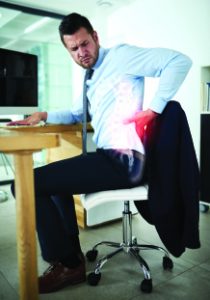 Back pain is one of the most common yet misunderstood conditions on the entire planet. And if you have back pain you know exactly what I mean. Chances are, if you have back pain, you may have been told you either have sciatica, bulging or herniated discs or arthritis (degenerative disc disease).
Back pain is one of the most common yet misunderstood conditions on the entire planet. And if you have back pain you know exactly what I mean. Chances are, if you have back pain, you may have been told you either have sciatica, bulging or herniated discs or arthritis (degenerative disc disease).
Sciatica
If a doctor told you that you have sciatica it means you have a condition that is affecting the sciatic nerve. The term sciatica is commonly used to describe pain traveling in the distribution of the sciatic nerve. Sciatica is a symptom caused by a disorder occurring in the lumbar spine.
Usually sciatica affects one side of the body. The pain maybe dull, sharp, burning, or accompanied by intermittent shocks of shooting pain beginning in the buttock traveling downward into the back or side of the thigh and/or leg. Sciatica then extends below the knee and may be felt in the feet. Sometimes symptoms including tingling and numbness, sitting and trying to standup may be painful and difficult. Coughing and sneezing can make the pain worse.
Herniated discs are the most common cause of sciatica in the lumbar spine. Degenerative disc disease is known to cause disc weakness that can be a precursor to disc herniation.
Lumbar spinal stenosis is a narrowing of one or more neural passageways due to disc degeneration and/or facet arthritis. The sciatic nerve may become impinged as a result of these changes. There are other conditions which may occur and may mimic true sciatica, but these are difficult to diagnose, and once again not common.
Herniated disc
Herniation describes an abnormality of the intervertebral disc that is also known as a slipped ruptured or torn disc.
This process occurs when the inner core (nucleus pulposus) of the intervertebral disc bulges out through the outer layer of ligaments that surround the disc (annulus fibrosis). This tear in the annulus fibrosis causes pain in the back at the point of herniation. If the protruding disc presses on a spinal nerve, the pain may spread to the area of the body that is served by that nerve like sciatica.
The causes of herniated discs are not entirely known, but are probably due to the function of the spine and long-term wear and tear. The two most common locations for a herniated disc in the lower back are active discs between fourth and fifth lumbar vertebra, L4–L5, and at the disc between the fifth lumbar vertebra and the first sacral vertebra, L5-S1. These two discs account for 98% of all herniation. A disc can occur elsewhere along the spine, but lower lumbar herniation is by far the most common. It is also important to note the two most common discs for herniation can cause the symptoms associated with sciatica!!!
Usually a patient’s main complaint is a sharp cutting pain. In some cases, there may be a previous history of episodes of localized low back pain, which is present in the back and continues down the leg that is served by the affected nerve.
Degenerative joint disease/arthritis
When degenerative disc disease becomes painful or symptomatic, it can cause several different symptoms including back pain, leg pain, and weakness that are all due to compression on the nerve roots.
As a result, people complain of back pain and stiffness especially toward the end of today.
The similarities, the solution
As you can see, whether you have a herniated/bulging disc, sciatica or degenerative joint disease, many of the symptoms are the same. In the end, no matter what it is called, you end up with abnormal pressure of your nerves from your disc. And that’s why all of these conditions are often helped buy the exact same treatment.
What our patients have to say about drx treatments
“I have had pain in my lower back for many years with little relief from cortisone and epidurals. However, the relief I have gotten from the DRX9000 has been outstanding! I have been able to work on my feet with hardly any problem at all. I have been able to walk with a little zip in my step. I’m very happy I took the time to try the DRX9000. Also, the care I have been given by the staff here at American Med-Care has been outstanding and I could not of asked for anything better.” – Andrew M.
The DRX 9000 has had great success with:
Herniated and bulging lumbar (low back) discs with or without complications
Degenerative disc disease
Sciatica and even more importantly to go along with the DRX 9000’s success rate, there were no documented side effects
“American Med Care Center is part of a new model of healthcare that is emerging.” Dr. Reimer states. “With advances in technology, a Wellness Revolution is occurring. Science is allowing us to better study the natural design and true physiological function of the body. Pain is seen as an important clue, proper function is seen as the physician’s goal and the stability of the systems of the body is the culmination of the therapy with participation of the patient.”
American Med Care Center offers a variety of treatment options for chronic back pain, sciatica, herniated or bulging discs, spinal stenosis, and Failed Back Surger Syndrome. To schedule an appointment, call the office at (561) 967-6655, or visit treatingyourbackpain.com.
Check Also
RejuvaNATION MedSpa: Elevating Men’s Health to New Heights
Embark on a Journey to Revitalize Your Vitality Rediscover the joy of a spontaneous sex …
 South Florida Health and Wellness Magazine Health and Wellness Articles
South Florida Health and Wellness Magazine Health and Wellness Articles




